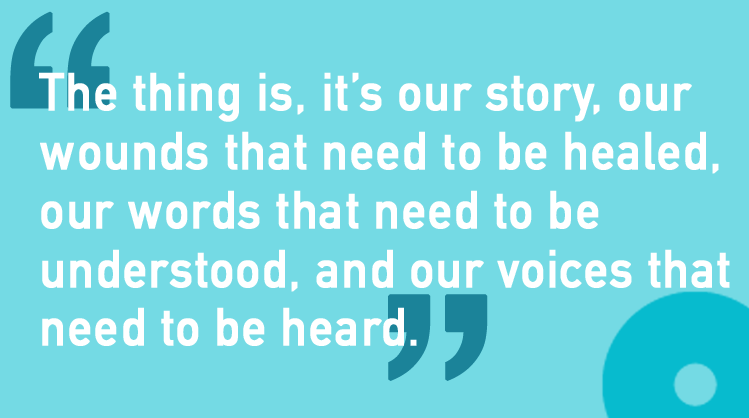An estimated 13% of the U.S. population is Deaf or hard of hearing, yet support systems for Deaf survivors are sorely lacking.
NO MORE is excited to present our latest blog piece written by Morgane and Ryan, student activists from Gallaudet University. NO MORE is proud to use our blog to give a voice to victims and survivors from all communities. Please share this story and help us activate your communities to end domestic violence and sexual assault.
Our names are Morgane Vincent and Ryan Klock, and we’re done being silent.
Silence is our world. We communicate visually rather than verbally through American Sign Language. For Deaf women and men, the risk of domestic violence and sexual assault is painfully high. Deaf and hard of hearing individuals are 150% more likely to be victims of assault, abuse and bullying in their lifetime. Domestic violence impacts one out of every two Deaf women, and one out of every six Deaf men.
We’re proud of our Deaf identity, but for some it is a reason to overlook us. While the Deaf community is assumed to be relatively small, individuals who are Deaf or hard of hearing make up 13% of the U.S. population, according to recent estimates. Yet, the support system for Deaf survivors is lacking. The few hotlines available for Deaf people are only operated between 9 am and 5 pm, Monday through Friday, but violence does not take a break after business hours or on weekends. Shelters and crisis centers lack adequate resources for Deaf individuals. Communication with a sexual assault and domestic violence resources is a strenuous process if one does not have a videophone, or access to on-call interpreters. In an emergency room setting, it generally takes up to 5 hours for a Deaf patient to receive an interpreter, and by then the damage and severity of the abuse could have increased. Often we stay with our abuser because the communication in the relationship is better than no communication at all. At least we know what to expect.
Our school, Gallaudet University, is the only Deaf University in the world. While we are proud of what the Gallaudet offers to our community, the university also harbors a dark secret. Rates of sexual assault and domestic violence are higher at Gallaudet than that any other university or college in DC, according to a Washington Post analysis. While we appreciate that the university has taken measures to address these issues, such as offering Greendot training, workshops and on-site training for faculty and students, we still have a long way to go.
Gallaudet is not unique among universities struggling to confront sexual assault and domestic violence, yet the Deaf experience is unique and presents a unique set of challenges. The increased risk of experiencing violence and abuse coupled with the lack of services tailored to meet the needs of Deaf survivors is something we as a society need to address–not just the deaf community . The reporting process through campus security too often results in “sweeping” the issue under the rug, and seeking help is even harder for Deaf students at non-Deaf universities, where there are fewer accommodations. This is why so many Deaf students either don’t report sexual assault altogether or are forced to go off campus to the emergency room rather than trust their universities to implement justice and put survivors first. This option is no picnic either. It is tough enough to have to tell a doctor (a stranger) about the abuse and/or assault, but imagine having to rely on an interpreter (also a stranger) to tell your story rather than being able to tell it yourself.
The thing is, it’s our story, our wounds that need to be healed, our words that need to be understood, and our voices that need to be heard. Rather than asking what universities can do for us, we need to take a stand and change how domestic violence and sexual assault are reported and the procedures used on campuses. It’s on us to fix and change a broken system, to improve reporting processes, to increase sensitivity training for campus security officers, and to inform and educate our peers. No more silencing Deaf voices. We need to open our eyes to abuse in the Deaf community.
If you or someone you know is in immediate danger please call emergency services like 911. In the current 911 system, Deaf and hard of hearing callers must use a teletypewriter (TTY) text telephone device or a telecommunications device for the deaf (TDD) to contact 911 in an emergency.
Other resources for the Deaf or hard of hearing individuals:
- To get help or more information on domestic violence services, contact the National Domestic Violence Hotline. Advocates who are Deaf are available by video phone at 1-855-812-1001 (Monday to Friday 9AM-5PM), by instant messenger (“DeafHotline”) and by email deafhelp@thehotline.org. Hearing advocates are available 24/7 by phone at 1-800-799-SAFE (7233) / 1-800-787-3224 (for TTY).
- For sexual assault counseling and services, you can chat with the National Sexual Assault Hotline here.
- For Gallaudet students, the Deaf Abused Women’s Service (DAWN) provides free on-campus support and advocacy services. Find more information here.